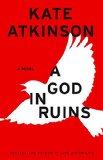Summary | Excerpt | Reviews | Beyond the Book | Read-Alikes | Genres & Themes | Author Bio

A Todd Family Novel
by Kate AtkinsonThis article relates to A God in Ruins
 Images of birds abound in Kate Atkinson's new novel, A God in Ruins - surprising, perhaps, even the author herself: "Just don't ask me why there are so many geese. I have absolutely no idea," she writes in her afterword. Most indelible, though, is the image of the skylark, which Atkinson includes near the book's opening, as a young Teddy walks through the countryside with his aunt. "The quivering flight of the bird and the beauty of its music triggered an unexpectedly deep emotion" in the boy, Atkinson writes.
Images of birds abound in Kate Atkinson's new novel, A God in Ruins - surprising, perhaps, even the author herself: "Just don't ask me why there are so many geese. I have absolutely no idea," she writes in her afterword. Most indelible, though, is the image of the skylark, which Atkinson includes near the book's opening, as a young Teddy walks through the countryside with his aunt. "The quivering flight of the bird and the beauty of its music triggered an unexpectedly deep emotion" in the boy, Atkinson writes.
Atkinson is certainly not the first writer to find beauty - and metaphoric urgency - in the skylark's flight and song ("Was there a poet who hadn't written about skylarks?" Teddy wonders). Despite its relatively drab coloration, the skylark has, in fact, been the subject of much celebration in literature and in song - or perhaps it is precisely the contrast between the bird's appearance and its song that inspires poetry. Some speculate that the equation of the skylark with freedom, hope, and joy is due to its varied (and, in England in spring and early summer, nearly incessant) singing, which is unusual because the bird sings not from a perch but while in flight.
 From the children's song "Alouette" (which is about plucking the feathers from a skylark to punish it for awakening the singer) to Ralph Vaughan Williams's lyrical work for violin and orchestra, "The Lark Ascending," the skylark has been the inspiration for songs and musical works. Perhaps most famous, though, are poems about skylarks, from Percy Bysse Shelley's "To a Skylark" (which "Pourest thy full heart / In profuse strains of unpremeditated art") to Wordsworth's "Ethereal Minstrel" in his own "To the Skylark." Shakespeare, Dickens, Milton, and even H. G. Wells have considered the humble but moving bird. A sci-fi series called Skylark (1946), by E. E. "Doc" Smith, is named after the bird too.
From the children's song "Alouette" (which is about plucking the feathers from a skylark to punish it for awakening the singer) to Ralph Vaughan Williams's lyrical work for violin and orchestra, "The Lark Ascending," the skylark has been the inspiration for songs and musical works. Perhaps most famous, though, are poems about skylarks, from Percy Bysse Shelley's "To a Skylark" (which "Pourest thy full heart / In profuse strains of unpremeditated art") to Wordsworth's "Ethereal Minstrel" in his own "To the Skylark." Shakespeare, Dickens, Milton, and even H. G. Wells have considered the humble but moving bird. A sci-fi series called Skylark (1946), by E. E. "Doc" Smith, is named after the bird too.
 Sadly, skylarks are not native to North America, and their population in Britain plummeted in the second half of the twentieth century due to habitat destruction and the use of pesticides (because skylarks feed on insects.) Britain is now offering incentives to farmers to preserve small parcels of farmland as habitat for these birds, as well as other species. Unless skylarks make a comeback, many of us will need to rely on the musings of literature and song to imagine this evocative bird.
Sadly, skylarks are not native to North America, and their population in Britain plummeted in the second half of the twentieth century due to habitat destruction and the use of pesticides (because skylarks feed on insects.) Britain is now offering incentives to farmers to preserve small parcels of farmland as habitat for these birds, as well as other species. Unless skylarks make a comeback, many of us will need to rely on the musings of literature and song to imagine this evocative bird.
A website dedicated to skylarks in poetry ensures ample reading about this songbird.
Skylark, courtesy of imgbuddy.com
The Skylark of Space, the first in the Skylark series
Another skylark, courtesy of Royal Society for the Protection of Birds
Filed under Nature and the Environment
![]() This "beyond the book article" relates to A God in Ruins. It originally ran in May 2015 and has been updated for the
January 2016 paperback edition.
Go to magazine.
This "beyond the book article" relates to A God in Ruins. It originally ran in May 2015 and has been updated for the
January 2016 paperback edition.
Go to magazine.
Your guide toexceptional books
BookBrowse seeks out and recommends the best in contemporary fiction and nonfiction—books that not only engage and entertain but also deepen our understanding of ourselves and the world around us.